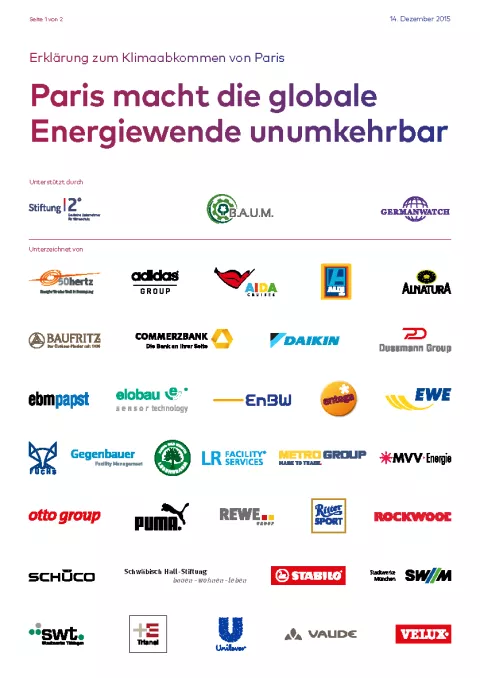
[Unauthorised translation of the German original: http://germanwatch.org/de/11433]
We, a collection of companies from various economic sectors, supported by business and civil society associations, are pleased that an agreement has been reached in Paris not only to limit global warming to well below 2°C but to pursue efforts to limit temperature rise to 1.5°C. We welcome the greenhouse gas neutrality target of the world economy, to be reached in the second half of the century. We also welcome the fact that all countries should strive to present long-term low emission development strategies.
The conference in Paris has impressively confirmed the growing international consensus that was last demonstrated at the 2015 G7 summit in Germany. Governments around the world are now serious about taking decisive action well before the end of the century to phase out fossil fuels in accordance with the findings of climate science. We welcome the clear commitment made by large industrial countries to undertake the necessary transformation of their energy systems by the middle of the century. This undertaking is now more feasible than ever thanks to declining costs for renewable energy and energy efficiency technologies.
We see clear signs of a new trend toward a global energy transition. Renewable energy has accounted for more than half of all worldwide investment in the electricity sector in recent years. Globally, energy-related CO2 emissions are stagnant. The gradual decarbonization of the global economy is not longer a vision for the future, but is taking place now. Paris marks a crucial turning point.
We are well aware of our responsibility as companies and we are ready to do our part to limit the global temperature increase to 2°C. We are committed to acting as pioneers in this new global transition. Therefore, we expect German and EU policymakers to provide a clear, long-term, and ambitious regulatory framework for this transition. At the international level, we hope to see that the countries of the world progressively commit to emission reduction pathways in accordance with the findings of the IPCC, as agreed in Paris.
Germany and the EU must lay the political and regulatory groundwork that allows decarbonisation to be both economically successful as well as socially equitable. Policymakers must create a solid foundation to support the trend towards green investment and lower CO2 emissions. Specifically, we call on policymakers to take the following actions:
1. … to develop a strategy to ensure that Germany's energy and emissions targets for 2020 can be met in all sectors.
2. … to adopt an ambitious Climate Action Plan for 2050 in accordance with the national energy and emissions goals set forth in the German government's Energy Concept for 2030, 2040, and 2050. This Climate Action Plan should seek to achieve emissions reductions by 2050 in line with the upper edge of the 80–95% reduction target corridor. The development of this plan should commence without delay in collaboration with all impacted stakeholders.
3. … to undertake a more comprehensive reform of the European Emissions Trading System (ETS) in order to trigger a CO2 price signal that is relevant for investment decisions. The ETS must be ambitiously designed so that it ensures emissions reductions in the sectors it covers that are consistent with Germany's targets for 2030, 2040, and 2050. It must also ensure a cost-effective pathway toward a 95% emissions reduction in the EU ETS by 2050.
4. … to make more rapid progress in adopting and implementing the legal framework that promotes energy efficiency. Policymakers should pursue an energy savings target of 40% by 2030, as proposed by the European Parliament.
5. … to create a political and financial framework for comprehensive change in the transportation sector, including a 95% greenhouse gas reduction goal in comparison to 1990 by 2050. In this regard, a key role must be played by the expansion of rail networks and the adoption of electric vehicles, in connection with an intelligent integration with energy systems.
6. … to initiate a process for increasing the EU's energy and emissions reduction targets for 2030. The Paris climate summit has laid the groundwork for this to take place, not least with the call for climate targets to be reviewed and enhanced every five years. The necessary foundation for this process is a regulatory framework that enables investments to be made in future-oriented energy and transportation systems.
Supported by: Stiftung 2° | B.A.U.M. e.V. | Germanwatch
Trianel | Unilever | VAUDE | VELUX Deutschland
